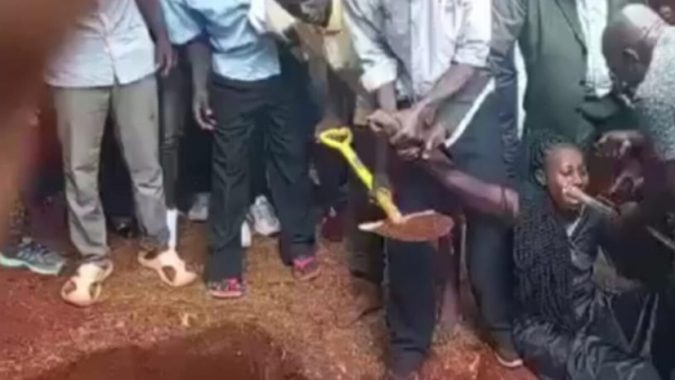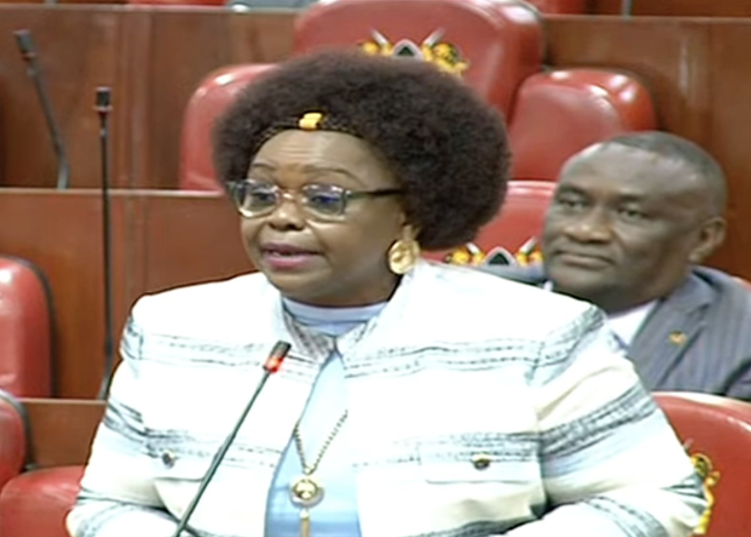Mellen Mogaka attack: 5 bizarre reasons why young widows avoid pouring soil into their late husbands’ graves

Mellen Mogaka, the woman at the centre of a violent altercation during her ex-husband’s funeral, has named 10 individuals she claims orchestrated her assault for refusing to perform a burial ritual.
Among those accused is her former brother-in-law, whom Mogaka says was among the main attackers.
“Nimepewa opportunity ya kuidentify hao ju mmoja wao ni ndugu ya my ex-husband anaitwa Oginda, he was the one mwenye alinigonga mbaka nikanyang’anywa simu,” Mogaka told reporters outside the Nyamira police station on Wednesday, March 26, 2025, describing how Oginda beat her and confiscated her phone.
Mogaka’s statement comes as three youths arrested in connection with the incident remain in custody for seven more days while authorities continue their investigation.
Speaking to the media, Mogaka appealed for the apprehension of a man she described as heavily built, claiming he assaulted her from a nearby tea plantation to the gravesite.
“Kuna mujamaa mwenye muliona mwenye ni kibonge, mwenye ni mnono, mwenye alinichapa kwanzia tukiwa kwa majani chai akanileta mbaka kwa kaburi akanichapa. Huyu tu polisi naomba tu, na Kenya yote iniskie, huyo mtu akiweza patikana that is the time yenye ntaona nimepata justice,” she said.

The viral video of the assault has reignited public debate around cultural practices in Western Kenya, particularly the ritual of widows pouring soil into their husbands’ graves.
This act, deeply rooted in Luo, Luhya, and Kisii traditions, carries significant social and spiritual implications.
Here are five reasons why young widows like Mogaka often avoid participating in the ritual:
1. Fear of being cursed
According to traditional beliefs among the Luo, Luhya, and Kisii communities, widows who pour soil into their late husbands’ graves risk bringing bad luck upon themselves.
There is a widespread belief that if a widow remarries after performing the ritual, her new husband could suffer an untimely death.
Many young widows fear these perceived spiritual repercussions and thus avoid participating in the ritual of pouring soil into their late husbands’ graves during burials.
2. Desire to remarry
For young widows, participating in this ritual is seen as a symbolic commitment to their deceased spouse.
By abstaining, they preserve their freedom to remarry without the stigma or fear of supernatural consequences.
This motivation is especially strong for women who wish to rebuild their lives and seek new partnerships after their husbands’ deaths.
In most cases, only elderly widows, who are not keen on remarrying, are the ones who pour soil into their late husband’s graves.
3. Cultural pressure and stigma
Young widows often face intense social scrutiny if they refuse to pour soil into their late husbands’ graves.
However, there is also cultural pressure to avoid the ritual to evade the associated taboos.
Often, young widows would fake fainting in a bid not to move closer to the gravesite so that they could avoid pouring the soil into the grave altogether.
Many young widows who feign illness or even faint during the burials do this to sidestep the practice discreetly without raising eyebrows.
4. Avoiding permanent ties to the husband’s family
Participating in the ritual is viewed as a symbolic act of loyalty to the deceased husband and his family.
By avoiding it, young widows may seek to sever ties and assert their independence, especially in cases where their relationship with their in-laws is strained.
Mellen Mogaka’s case highlights how these tensions can escalate into violence when cultural expectations are defied.
5. Protection from future violence or harassment
For some young widows, avoiding the ritual is a means of self-preservation.
Participating could leave them vulnerable to further demands or control from their in-laws.
Mellen Mogaka’s assault underscores the risks women face when rejecting cultural norms, with her public identification of the perpetrators shedding light on the violence that can follow non-compliance.
The Nyamira incident has sparked widespread outrage, with activists calling for stronger legal protections for women facing cultural coercion.
As authorities pursue justice for Mellen Mogaka, the case has brought renewed scrutiny to the intersection of tradition and human rights in Kenya’s rural communities.
The investigation continues as police review Mogaka’s new evidence, with growing calls to hold all those responsible accountable.
Author
Martin Oduor
The alchemist of literary works - a master wordsmith with a proven record of transforming the raw materials of language into a rich tapestry of emotion, thought, and imagination.
View all posts by Martin Oduor















